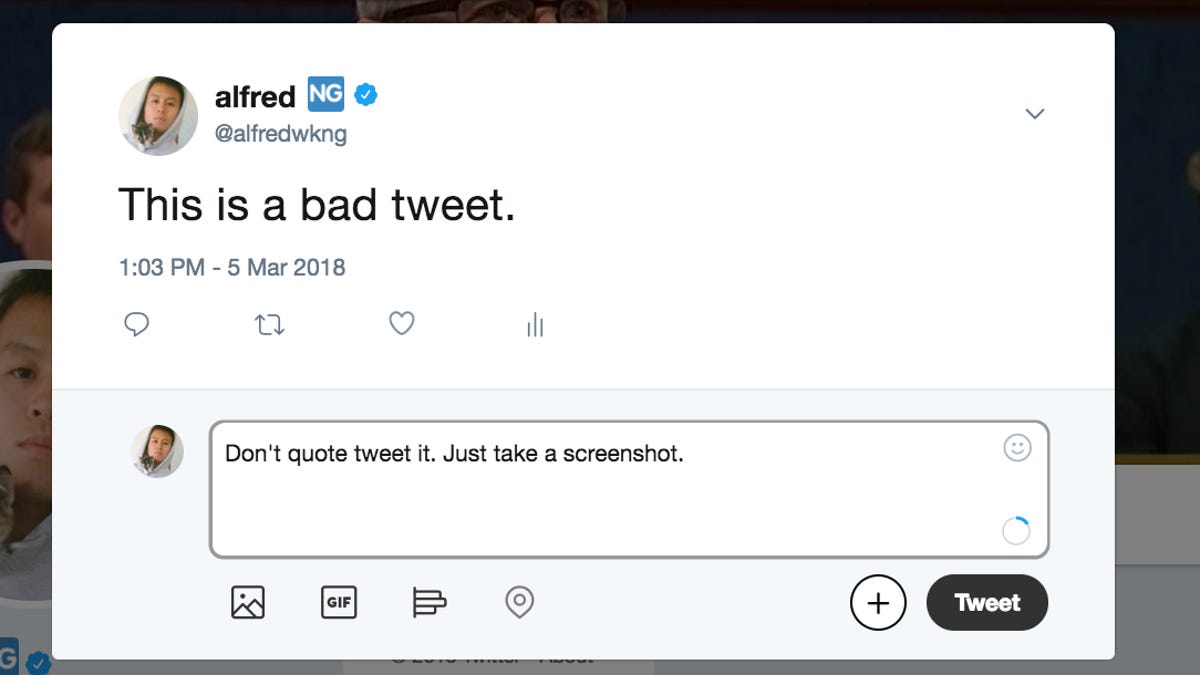Your quote tweets make bad tweets worse. Do this instead
Critics denouncing Parkland shooting conspiracy theories ended up fanning the flames on social media. Here’s how you can criticize without amplifying.

Taking a screenshot is better than quote-tweeting a post you're speaking out against.
Algorithms on social media don't care if you share something because you're for it or against it.
And if you're against it, your post could backfire.
A share is a share, and it only serves to draw more attention to the post you're arguing against, despite your best intentions, social media experts say. That's why when four prominent accounts on Twitter, including former first daughter Chelsea Clinton, last month shared a conspiracy theory post tied to the Parkland, Florida, high school shooting in order to denounce it, they ended up fueling the fire instead of putting it out.
Jim - could you please return to attacking me (or really any grownup) instead of the courageous #Parkland students? Thank you. https://t.co/t8ngiLllS6
— Chelsea Clinton (@ChelseaClinton) February 20, 2018
The four tweets ended up accounting for more than 60 percent of the total mentions on the original story, according to Wired, bringing attention to what is essentially a fake news take on the shooting. But experts say there are better ways to criticize something on Twitter. Stop engaging, whether it's through a quote-tweet or a share. Just take a screenshot.
"If you have a very large following, quote-tweeting it is spreading it and problematic," said Jennifer Grygiel, a social media professor at Syracuse University. "You should try to reference it without perpetuating it."
When about a quarter of American adults get their news from social media, quote-tweets and retweets can end up influencing news feeds for millions of people.
Outrage machine
Creating outrage has become a common plan of attack for trolls on social media: Any attention is good, and controversy courts reactions.
It's the same playbook Russian trolls from the Internet Research Agency used when they set out to disrupt the US presidential election in 2016. The trolls masked themselves as activists speaking on behalf of Black Lives Matter and gun rights groups and posted the most divisive content they could. The angry responses pretty much guaranteed that their posts and tweets would pop up on news feeds. Twitter said 1.4 million people were exposed to Russia propaganda on its platform. Facebook said the disinformation reached 126 million people.
Facebook and Twitter didn't respond to requests for comment.
On Feb. 16, US Special Counsel Robert Mueller filed an indictment against the IRA for its trolling efforts tied to the 2016 election. He charged 13 Russians involved with using Facebook and Twitter for "information warfare."
Two weeks later, Twitter CEO Jack Dorsey acknowledged his site's problems with trolls and online harassment, writing that the company "didn't fully predict or understand the real-world negative consequences." He also acknowledged that people have been taking advantage of Twitter's algorithms and is asking the public to submit proposals on how his company can improve.
"Bad actors know that if they say something that incites others, it'll drive up their post," said Cliff Lampe, a social media professor at University of Michigan's School of Information. "It creates an incentive for them to say something offensive."
Bearing witness
So how does this all work in a world where it's also important to be able to criticize content on social media, especially since silence can be misinterpreted as acceptance? Calling out bad takes is an integral part of holding voices online accountable.
"We're all bearing witness to these tragedies, and just remaining silent doesn't help pushing forward social change. It doesn't help advocate for social justice issues," Grygiel said.
Taking a screenshot of the tweet you're criticizing may be a more effective way to reference it without giving the post a social boost -- you're cutting off engagement to the original source.
Turns out screenshots are also a pretty effective archiving tool for social media.
For a while on Twitter, people who misspoke were leaving their inaccurate tweets alone, arguing that this was a way to "preserve the record" even as they also posted a correction. Taylor Lorenz of the Daily Beast suggested instead taking a screenshot of your incorrect tweet, deleting the original and posting the screenshot with your correction.
The problem with that approach is that trolls can exploit it to make matters worse, not better. After the mass shooting at the Florida high school, trolls Photoshopped a tweet by a Miami Herald reporter to make it appear she'd asked for videos of "dead bodies." She did not.
People are also quick to trust screenshots, even if it's ridiculous stuff.
When the Twitter joke account Pixelated Boat tweeted a doctored excerpt from Michael Wolff's book "Fire and Fury," claiming President Trump watched the "Gorilla Channel" 24 hours a day, it quickly trended on Twitter and even fooled several analysts.
So you need to make sure screenshots aren't fake, which adds extra work to finding the truth. But taking that extra step is worth it if you want to avoid inadvertently helping to popularize a message you're actually criticizing.
"If you have a large audience, with that comes responsibility," Grygiel said. "If it takes you a couple more seconds to do it in a way that will not perpetuate harm, then you need to do that."
iHate: CNET looks at how intolerance is taking over the internet.
Security: Stay up-to-date on the latest in breaches, hacks, fixes and all those cybersecurity issues that keep you up at night.

